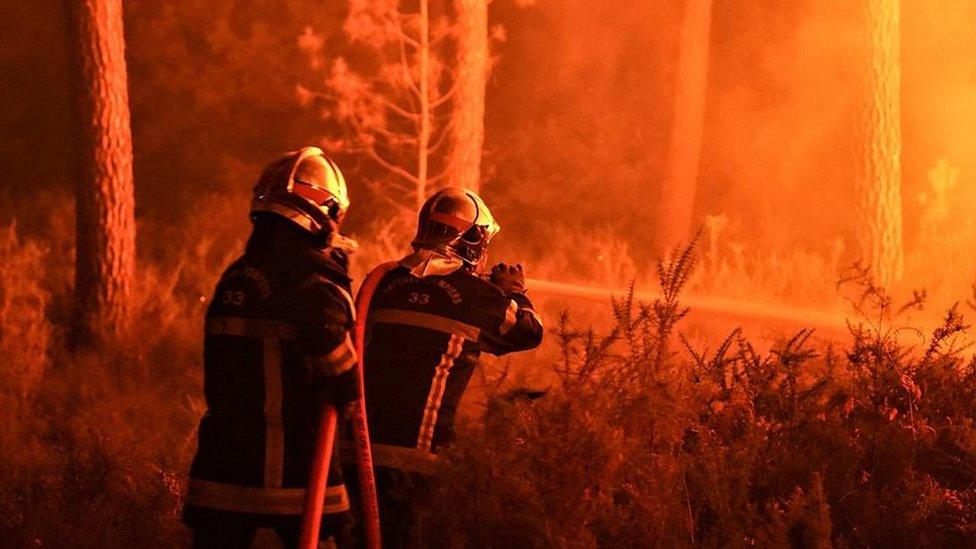France Wildfires: EU countries send firefighters to France to help tackle fires
- Published
- comments

Firefighters tackling the blaze at night near Hostens in Gironde
Firefighters from Germany, Romania and Greece have been sent to help battle a huge wildfire in southwest France.
More than 1,000 French firefighters have been tackling the fire this week, which is about 30km (19 miles) south-east of Bordeaux.
The blaze, which has been raging for several days, has forced more than 10,000 people to leave their homes.
There have been no injuries, but more than a dozen properties have been destroyed, as well as more than 7,400 hectares of forest.
This summer France and a number of other European countries have seen a wave of deadly wildfires, triggered by record temperatures and droughts across the continent.
A wildfire is also raging in the mountainous Serra de Estrela park in central Portugal, where 10,000 hectares of forest has been destroyed.
This area of Portugal is sparsely populated so not many people have been affected but about 1,500 firefighters there are tackling the blaze.
Other countries send help to France
Firefighters from countries including Romania have arrived in France to help fight the blaze
The French authorities say the fires have now largely been contained and haven't spread to new areas overnight, but strong winds and high temperatures have been making the firefighting operation more difficult.
High temperatures and a worsening drought has brought a high risk of new fires breaking out in the region, officials have said.
Firefighter representative Gregory Allione told France's RTL Radio, "It's an ogre, it's a monster."
Water-bombing aircraft are being used to help fight the fire, with France also getting some firefighting aircraft from Greece and Sweden.
Sixty-five German firefighters have arrived from Bonn and others from Poland and Romania are expected in the fire zone soon.
Water-bombing aircraft are being used to tackle the wildfire in Gironde
The Gironde wildfire in France is one of many that have broken out across Europe this summer, triggered by heatwaves that have led to record temperatures.
The Gironde has already been affected by major wildfires this year. In July, the fires destroyed more than 20,000 hectares of forest and temporarily forced almost 40,000 people from their homes.
The fire in the region has been raging for several days
In a statement given earlier this week, the authorities battling the blaze warned that extreme dry heat is likely through the weekend, saying "conditions are particularly difficult: the vegetation and soil are exceptionally dry".
"There is a very serious risk of new outbreaks," it said.
Temperatures as high as 40C were expected in the southwest, with high temperatures also expected across much of France, France's official weather forecast said.
The heatwave, which is officially France's third this summer, is set to reduce in severity on Saturday and end on Sunday with storms, according to the forecasters.
More than 10,000 people have been forced to flee their homes because of the fires
What's caused the fires?
It's not known how the wildfires in France started, but most wildfires are caused by human activity such as bonfires or barbecues.
However, the fires spread faster and further during hot and dry periods of weather.
Heatwaves have become more frequent, more intense, and are lasting longer because of climate change caused by human activities.
Huge areas of forest in southwestern France have been destroyed as a result of the fires
Climate change increases the risk of the hot, dry weather that is likely to fuel wildfires.
The world has already warmed by about 1.1C since the industrial era began and experts warn temperatures will keep rising unless governments around the world make big cuts to carbon emissions.
- Published15 July 2022
- Published17 July 2022
- Published22 July 2022
